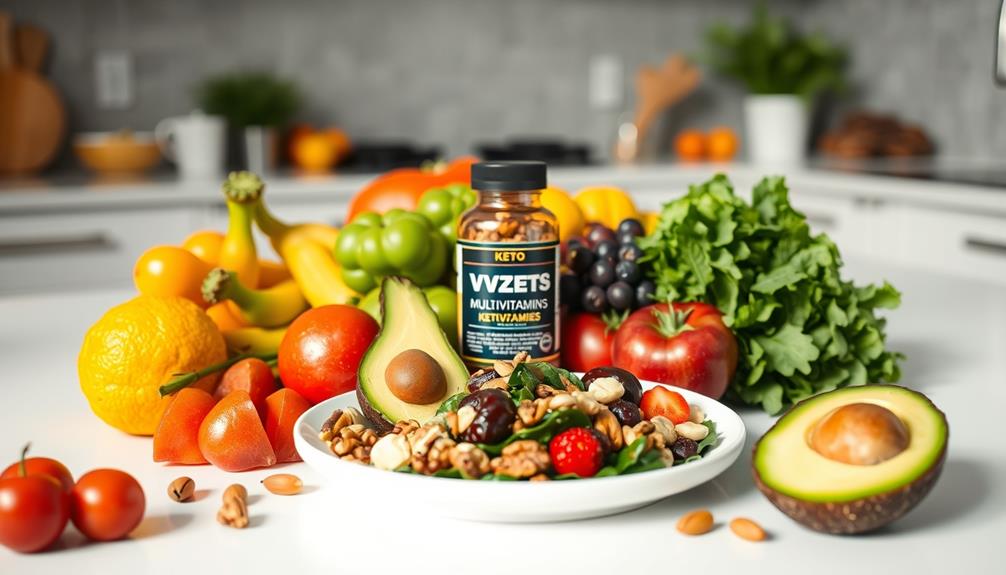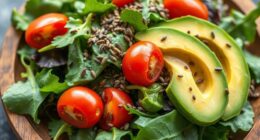The best vitamins for your keto diet are vital for maintaining overall health. Focus on getting enough vitamin D to support calcium absorption and immune function—aim for 1,500-2,000 IU daily. Don't forget vitamin C for immune health and B vitamins for energy metabolism, especially during those initial "keto flu" symptoms. Magnesium is important too, with a daily intake of 310-420 mg to prevent muscle cramps and fatigue. Including potassium and calcium can also help with electrolyte balance. Curious about the best sources and supplement options? Stick around for more insights on optimizing your keto journey.
Key Takeaways
- Vitamin D is essential for calcium absorption; consider 1,500-2,000 IU daily to support immune health on a keto diet.
- Vitamin C supports immune function; aim for at least 60 mg daily to maintain optimal health.
- B Vitamins, including B6 and B12, are crucial for energy metabolism and managing keto flu symptoms.
- Magnesium, with a recommended intake of 310-420 mg, helps prevent muscle cramps and fatigue on a keto diet.
- Consider quality supplements from brands like Perfect Keto and Thorne Research to meet essential vitamin needs effectively.
Importance of Vitamins on Keto

Vitamins play an essential role in your health, especially when following a keto diet. This diet can limit your food variety, making it critical to monitor your vitamin intake to prevent nutrient deficiencies. For instance, Vitamin D is essential for calcium absorption and immune function; without it, you may face health issues.
Additionally, gastrointestinal issues can arise from a lack of certain vitamins, affecting your overall well-being. Similarly, a lower intake of Vitamin C, which is necessary for immune health, can occur on a ketogenic diet. You might need to take into account supplementation to meet the recommended daily intake of 60 mg.
Additionally, Vitamin B complex supports energy metabolism, helping you manage symptoms of the "keto flu" while shifting to a low-carb lifestyle. Regular intake of Vitamin E is also recommended, as it bolsters your antioxidant defenses, countering increased oxidative stress from higher fat consumption.
Lastly, don't overlook Vitamin A, which is critical for vision and immune function. Include keto-friendly sources like liver and dairy products in your diet to guarantee adequate levels.
Essential Vitamins for Keto

When starting on a keto diet, you might find that certain vitamins become essential for maintaining ideal health.
Vitamin D is critical for calcium absorption and immune function, so consider supplementation of 1500-2000 IU daily, especially if you live in areas with limited sunlight.
Additionally, it's important to monitor your hydration levels, as proper water intake can enhance nutrient absorption and overall well-being.
Vitamin C supports immune health and helps with collagen production, and you may need to supplement to meet the daily intake of at least 60 mg, especially during cold seasons when cold medications might be necessary.
B Vitamins, including B6, B12, and folate, are indispensable for energy metabolism and brain health.
A multivitamin can help guarantee you're getting enough, especially when your food variety is limited on a keto diet.
Vitamin E acts as an antioxidant, protecting your cells from oxidative damage, and you can find it in nuts and seeds, staples in the keto lifestyle.
Key Nutrient Deficiencies

On a keto diet, you may find yourself facing key nutrient deficiencies that can impact your overall health. Certain essential nutrients are often lacking due to restricted food choices, leading to potential health risks. Below is a breakdown of common deficiencies and their daily intake recommendations:
| Nutrient | Recommended Daily Intake | Potential Health Risks |
|---|---|---|
| Magnesium | 310-420 mg | Muscle cramps, fatigue |
| Calcium | 1,000-1,200 mg | Osteoporosis, bone health loss |
| Vitamin D | 1,500-2,000 IU | Weak immune system |
| Potassium | 4.7 grams | Muscle weakness, cramping |
| Iron | 8 mg (men), 18 mg (women) | Anemia, fatigue |
To combat these nutrient deficiencies, consider supplementation tailored to your specific needs. Magnesium, vitamin D, calcium, potassium, and iron are essential for maintaining peak health while on a keto diet. Regular monitoring of your nutrient levels can help guarantee you meet your daily intake and avoid long-term health issues. So, stay proactive about your nutrition and consider discussing supplementation with a healthcare professional to keep your body functioning at its best.
Best Supplement Sources

When you're on a keto diet, choosing the right supplement sources can make a big difference.
It's crucial to focus on incorporating a balanced diet rich in sustainable weight loss to guarantee you're meeting all your nutritional needs.
You can find top keto supplement brands that offer high-quality magnesium, omega-3s, and vitamin D, or you might prefer natural food sources to meet your nutritional needs.
It's all about what works best for your lifestyle and preferences.
Top Keto Supplement Brands
Finding the right supplements for your ketogenic diet can make a significant difference in your overall health and well-being. When it comes to choosing top keto supplement brands, several stand out for their quality and effectiveness. Perfect Keto and Bulletproof offer a variety of products like MCT oil, collagen, and electrolytes, specifically formulated to support keto dieters.
Understanding your investment goals in health can guide you in selecting effective supplements that align with your dietary needs.
For those looking to boost their magnesium and omega-3 intake, brands such as Garden of Life and NOW Foods provide high-quality supplements that help you meet your nutritional needs. If you're concerned about quality control, Thorne Research is a trusted name, known for its stringent testing processes and high-quality vitamin D and essential micronutrients.
Additionally, Sports Research offers high-potency fish oil supplements rich in EPA and DHA, catering to the increased omega-3 requirements of keto dieters.
Natural Food Sources
Choosing the right supplements is important, but you can also get many of the nutrients you need directly from natural food sources. On a ketogenic diet, focusing on nutrient-rich foods is essential to meet your daily intake requirements.
Additionally, incorporating certain essential oils into your wellness routine can complement your nutritional needs, as they offer various health benefits, including essential oils for respiratory health.
For magnesium, consider consuming spinach, broccoli, and avocados. Depending on your age and gender, aim for 310-420 mg daily.
Calcium, essential for bone health, can be sourced from sardines, salmon with bones, and leafy greens like kale, with a recommended intake of 1,000-1,200 mg.
To boost your omega-3 fatty acids, fatty fish like salmon and mackerel are excellent choices. You should target at least 500 mg of EPA and DHA for ideal health.
Vitamin D is crucial for calcium absorption; get it from fatty fish, egg yolks, and fortified foods, aiming for 1,500-2,000 IU daily, especially if you're in low-sunlight areas.
Managing Keto Flu Symptoms

As you commence your ketogenic journey, managing the symptoms of keto flu is essential for a smoother change. During this initial adjustment, you might experience headaches, fatigue, and irritability due to electrolyte imbalances and nutrient deficiencies.
To combat these symptoms, focus on your sodium intake. Increasing it through sources like broth or electrolyte supplements is vital, as lower insulin levels during ketosis can lead to increased sodium excretion.
Additionally, consider potassium supplementation, aiming for about 4.7 grams daily. This can help alleviate fatigue and muscle cramps, which are common in those experiencing keto flu.
Magnesium is another key player; supplementing with 200-400 mg daily can ease muscle cramps and sleep disturbances often associated with these early days of the ketogenic diet.
Electrolyte Balance and Health

Maintaining electrolyte balance is essential for your health while on a keto diet. When you switch to a low-carb lifestyle, your body excretes more sodium and potassium, which can lead to deficiencies. This is why you might experience symptoms like headaches, fatigue, and irritability, often referred to as the "keto flu."
Health professionals recommend a daily intake of about 3-5 grams of sodium, 4.7 grams of potassium, and 300-500 mg of magnesium to keep your bodily functions running smoothly.
To support your electrolyte balance, incorporate foods rich in potassium, such as avocados and leafy greens, into your meals. Additionally, magnesium sources like nuts and seeds are great options.
If you find it challenging to meet these needs through food alone, consider supplementing with electrolyte powders or drinks. This can help restore balance and alleviate those pesky keto flu symptoms, especially during the initial adaptation phase.
Regularly monitoring and replenishing your electrolytes is vital, so pay attention to your body's signals and stay proactive in maintaining your health on the keto diet.
Tips for Effective Supplementation

When it comes to effective supplementation on a keto diet, consulting with a healthcare provider is crucial. They can help you determine which supplements meet your individual health needs and avoid potential interactions with medications.
While it's important to focus on whole foods for nutrients, consider adding magnesium (200-400 mg daily) and electrolytes to fill any dietary gaps.
When selecting supplements, prioritize products that have undergone third-party testing for quality, potency, and safety. This guarantees you're getting what you pay for and helps protect your health.
Start with lower doses of new supplements to assess how well you tolerate them. This is particularly important for MCT oil and fiber supplements, which can cause gastrointestinal discomfort if introduced too quickly.
Keep a detailed record of your supplement intake and any changes in your health. This will allow you to adjust dosages as needed and maintain ideal nutrient levels while on the ketogenic diet.
Frequently Asked Questions
Should I Take Vitamins While on Keto?
Yes, you should consider taking vitamins while on keto. This can help prevent nutrient deficiencies due to limited food choices. A daily multivitamin and electrolyte support can make a significant difference in your overall health.
What Vitamins Are You Lacking on Keto Diet?
Many keto dieters often miss out on essential nutrients. You might find yourself lacking magnesium, calcium, and vitamin D, which are vital for overall health. Don't forget to monitor your B vitamin levels too!
What Supplements Can You Take on a Keto Diet?
You can take magnesium for muscle support, MCT oil for quick energy, electrolyte supplements to prevent keto flu, omega-3s for heart health, and vitamin D to boost immunity on your keto journey.
What Vitamins Should I Take for Hair on Keto?
You might wonder if your diet's affecting your hair. To boost hair health on keto, consider taking biotin, zinc, vitamin D, omega-3s, and vitamin E. These vitamins help combat potential deficiencies and support overall hair health.
Conclusion
So, as you commence your keto adventure, don't let your vitamin levels drop faster than a low-carb cookie. Picture yourself as a superhero, cape flapping, armed with your essential vitamins, battling nutrient deficiencies like a pro. Embrace those supplements and electrolytes while dodging the dreaded keto flu like it's a dodgeball tournament. Remember, a well-balanced diet is your trusty sidekick, so gear up and conquer your keto journey with flair!









